Adult Track: Chelsea Mackey, MS | Autism and Developmental Disabilities Track: Emily-Anne del Rosario, MA | Behavioral Medicine: Mara Tynan, MS | Child Track: Grace Woodard, MS | Rehabilitation Neuropsychology Track: Katie Luna, MS
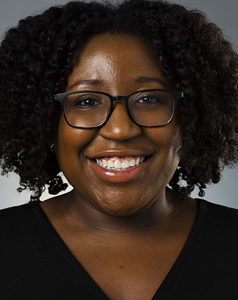 |
Chelsea Mackey, MSWhy UW Psychology Internship?I was drawn to UW General Adult Track Psychology Internship for its robust generalist training and the breadth of experiences it offers. I knew this program would provide the foundation to continue developing as an adaptive and confident clinician and researcher. My rotation in the UW Outpatient Psychiatry Clinic (OPC) offers outstanding training in comprehensive Dialectical Behavioral Therapy (DBT) alongside strong generalist training experiences. |
| At OPC, I have been able to strengthen my knowledge and delivery of evidence-based therapies in both individual therapy and group-based interventions.
At Fred Hutch, I am gaining proficiency in working with individuals facing comorbid medical illnesses and psychosocial challenges. Working on a collaborative care team, I primarily treat individual patients with psychosocial stressors, depression, anxiety, end-of-life concerns, demoralization, and grief. I am also co-leading a Living with Cancer DBT-based skills group to support patients navigating their cancer diagnoses. UW is also committed to supporting residents’ research endeavors and offers experiences that align with my research goals. This includes 4 hours per week of protected research time, research mentorship, and access to a grant-writing and professional development seminar. These resources have allowed me to collaborate with highly productive, federally funded researchers, engage in new research projects, and have protected time to complete my dissertation. As a bonus, having lived in Seattle for the past 5 years, I can personally attest to it being a wonderful place to live and offering an abundance of fun activities. Education
Clinical Rotations
Career GoalsMy overarching career goal is to pursue a career as a clinician scientist in an academic medical center where I can develop and disseminate community-driven and culturally informed prevention and intervention strategies to reduce substance use disparities among minoritized populations. Drawing upon an interdisciplinary approach, I intend to identify causal mechanisms in substance use outcomes and collaborate with researchers and community partners from various disciplines to develop comprehensive frameworks for studying psychosocial, systemic and structural factors contributing to such disparities using a community-based participatory research framework. UW’s internship program has been an ideal environment for advancing me toward my career goals. Follow me for a week!Sunday
Monday (OPC-DBT)
Tuesday (OPC )
Wednesday (FHCC)
Thursday (Research + Didactics)
Friday (OPC)
Saturday
|
|
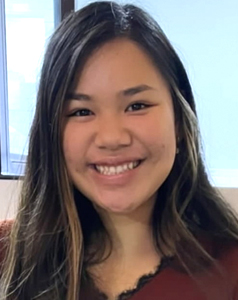 |
Emily-Anne del Rosario, MAWhy UW Psychology Internship?I was interested in the Autism and Developmental Disabilities Track at UW because of the diverse training opportunities in clinical work and research. At the UW, I have the ability to pursue and increase my depth of knowledge in treatment of autism and related developmental disabilities in both outpatient and inpatient settings. Residents in this track can expect to receive ample training in assessments (e.g., Child Development Clinic, Infant Development Clinic, Specialized Neurodevelopmental Assessments, Gender Clinic, etc.) and intervention for parents |
| (e.g., RUBI, Families moving Forward, etc.) and children (e.g., Gender Clinic, Mood and Anxiety Clinic, Early Intervention, etc.). My planned rotations allow me to expand my knowledge of my treatment population of interest as well as diversify my clinical skills in new areas.
Although the focus of internship is clinical work, I appreciate UW’s protected 4-hrs/wk research time. This allows me to focus on my clinical work as well as finish my dissertation (and engage in other research on campus) all while providing me with an appropriate work-life balance. The faculty and supervisors I work with are extremely supportive by providing thoughtful feedback, protecting my writing time for notes/reports, and making sure I don’t feel overworked. Lastly, the Pacific Northwest is beautiful area to live making life outside of work incredibly enjoyable! Overall, UW was a clear choice for me with the variety and breadth of clinical work, supportive faculty, and unbeatable location. Education
Clinical Rotations
Career GoalsMy goal is to continue a career as a clinician scientist at an academic medical center or children’s hospital. I hope to pursue autism and related developmental disorders focused research and clinical work. For research I want to look into barriers to treatment for autistic children and their families, specifically for BIPOC and other marginalized groups. Follow me for a week!Sunday
Monday (Institute on Human Development and Disability)
Tuesday (Seattle Children’s Magnuson – SNACS)
Wednesday (Seattle Children’s Magnuson – Early Intervention & RUBI)
Thursday (Remote/UWMC)
Friday (Seattle Children’s Magnuson – Gender Clinic)
Saturday
|
|
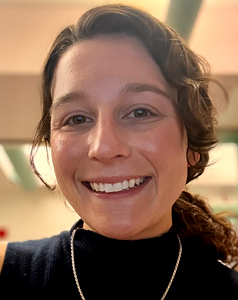 |
Mara Tynan, MSWhy UW Psychology Internship?I was immediately interested in the UW Psychology Internship program because of the wide array of experiences that it offers. Heading into internship, my goals were to hone my clinical skills in both inpatient and outpatient settings with new clinical populations. Having had inpatient medicine experience on a burn unit during graduate school, I found myself wanting more exposure to rehabilitation psychology. |
| At UW we are able to work with patients with a variety of diagnoses including SCI, TBI, amputation, and stroke, and learn how to support patients throughout the entire rehab process from initial inpatient rehabilitation hospitalization through to outpatient care.
Moreover, UWMC is well-known for integration of clinical practice and research and has a reputation of producing strong clinical research. I was excited by UW’s commitment to supporting students’ research endeavors by connecting students with research mentors that match their area of interest and by protecting at least four hours of research time per week. I had heard great things about the supervising faculty at UW as well. Each resident is matched with a non-evaluative mentor in addition to their supervisors and program director. Each supervisor seems motivated to help residents get the most out of this clinical year that they can, attending to each resident’s individual professional goals. I am also very excited about all of the trails, lakes, and places to explore in Seattle and surrounding areas! Education
Clinical Rotations
Career GoalsMy career goals include finding a balance of research and clinical work in an academic medical center. My clinical interests lie in rehabilitation populations like SCI and amputation, which dovetails well with my research interests in chronic pain populations. I hope to be able to integrate my research and clinical work symbiotically to both help individuals undergoing the rehabilitation process while also improving pain assessment and treatment on a broader scale. Follow me for a week!Sunday
Monday
Tuesday
Wednesday
Thursday
Friday
Saturday
|
|
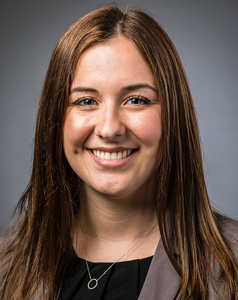 |
Grace Woodard, MSWhy UW Psychology Internship?The opportunity to return to my home state of Washington was immediately appealing, but the UW child track offered much more than geographic convenience. The program’s comprehensive generalist training perfectly aligned with my goals, providing the breadth of experience I sought across inpatient care, high-acuity outpatient services, and consultation-liaison work. The diverse minor rotation options within the outpatient track particularly excited me, as they would allow me to explore specialized areas and identify my future clinical interests. |
Beyond the clinical training, several structural elements of the program stood out. The weekly 4-6 hour research release time demonstrates a genuine commitment to scholarly development, while Seattle Children’s Hospital’s professional development funding shows investment in trainees’ growth. Most compelling was the program’s exceptional emphasis on neuropsychological assessment training—an area where UW clearly exceeds other programs I considered. For example, the Specialized Neurodevelopmental Assessment and Consultation Service (SNACS) would allow me to develop expertise with developmentally complex populations, particularly youth with prenatal alcohol or substance exposure. Combined with inpatient neuropsychological assessment experience in the Psychiatric and Behavioral Medicine Unit (PBMU), the UW Child Track provides the specialized assessment skills I’m eager to develop.Perhaps most importantly, the program’s culture resonated with me during interviews. The genuine prioritization of resident training, the authentic commitment to work-life balance (maintaining 40-hour weeks in practice, not just policy!), and the culture of continuous improvement through systematic feedback collection all signal a training environment where I could thrive both professionally and personally.
Education
Clinical Rotations
Career GoalsMy goal is to participate in research and clinical work in an academic medical center or children’s hospital setting. I am interested in program evaluation and evidence-based practice implementation work in community settings. Specifically, I have studied the implementation of measurement-based care and exposure-based therapies (e.g., TF-CBT, CBT for anxiety) for youth in community settings. Clinically, I am interested in providing therapy services as well as neuropsychological assessment. Lastly, I would like to be a part of clinical training and supervision of graduate students, and I have appreciated the opportunity to receive training in my supervision skills within the SNACS clinic. Follow me for a week!Sunday
Monday (SNACS + Training Clinic)
Tuesday (MAP + Training Clinic)
Wednesday (EDRP)
Thursday (Research + Didactics)
Friday (SNACS)
Saturday
|
|
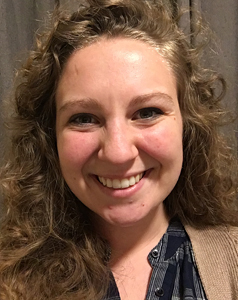 |
Katie Luna, MSWhy UW Psychology Internship?The UW Psychology Internship Program is unique among neuropsychology internship training sites in that the patients are from a physical rehabilitation population. There is a unique and meaningful balance of the same diagnoses I am exploring for neuropsychological evaluations, are the same diagnoses of my outpatient therapy clients (e.g., brain tumor, stroke, aphasia, TBI, hydrocephalus). This enriches training in neuropsychology immeasurably as you learn the neurological and cognitive sequalae of a disease while interacting with the everyday |
| experience of clients who are living with that neurological condition. I highly recommend this marriage of training experiences.
Additionally, the atmosphere created by the supervisors and cohort experiences form a supportive culture for daily learning. The neuro rehab track is embedded in the BMed track such that there is individualized supervision in neuropsychology with embedded experiences alongside the BMed track residents, such as journal club and weekly NP seminar. Education
Clinical Rotations
Career GoalsAs an aspiring neuropsychologist, I plan to complete a post-doctoral fellowship in Clinical Neuropsychology. I look forward to ultimately working at a university where I can split my time between conducting formal neuropsychological evaluations and training the next generation of neuropsychologists. Follow me for a week!Sunday
Monday (SNACS + Training Clinic)
Tuesday
Wednesday
Thursday
Friday
Saturday
|
|
Last Modified: August 26, 2025